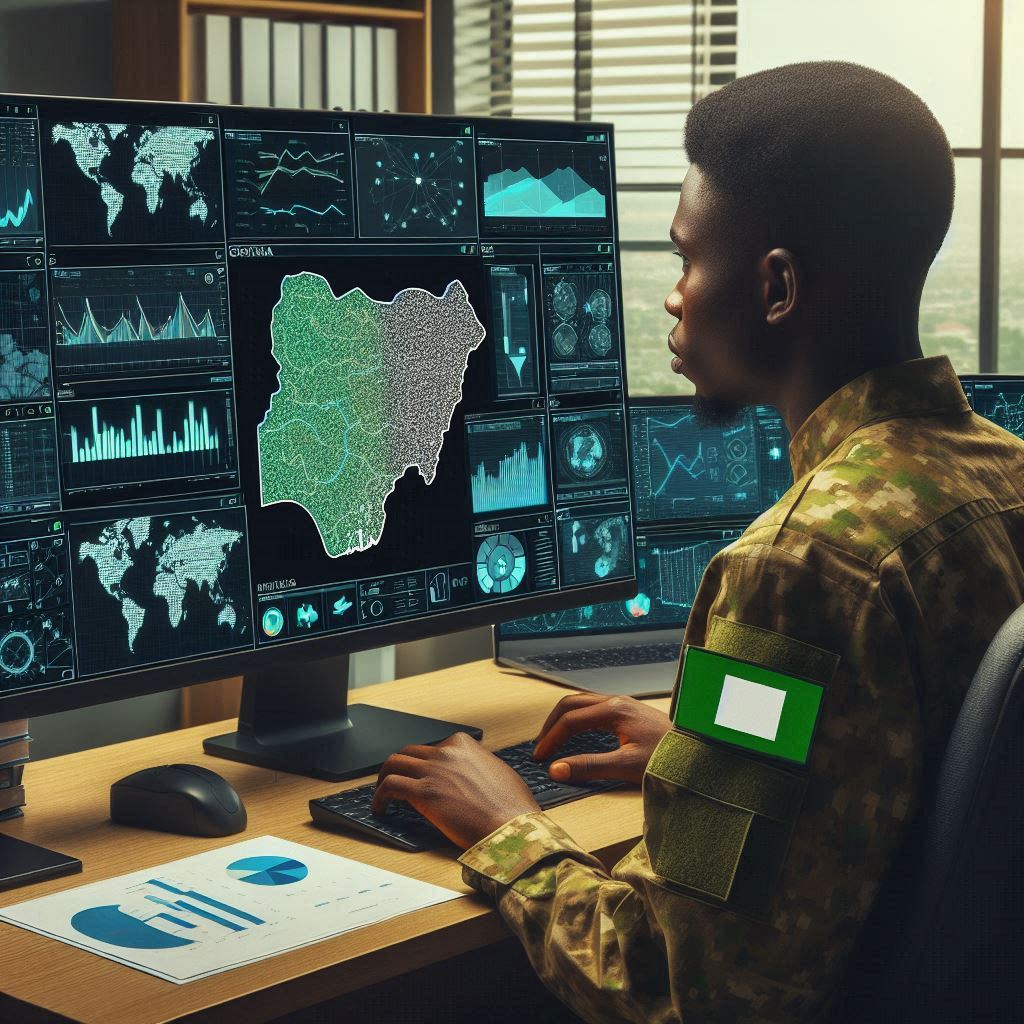Introduction
Cartography, the science and art of mapmaking, holds immense significance in Nigeria’s multifaceted landscape and cultural mosaic.
It serves as a fundamental tool for understanding geographical features, navigating complex terrains, and preserving cultural heritage.
Brief Explanation of Cartography
Cartography involves the creation, interpretation, and analysis of maps to represent spatial information effectively.
In Nigeria, cartography encompasses a wide range of applications, from mapping urban infrastructure to charting agricultural landscapes and delineating administrative boundaries.
Importance of Cartography in Nigeria
The importance of cartography in Nigeria cannot be overstated.
It underpins crucial decision-making processes across various sectors, including urban planning, natural resource management, environmental conservation, and disaster response.
Additionally, cartography plays a pivotal role in preserving cultural heritage, documenting historical landmarks, and promoting tourism.
Basically, cartography serves as a cornerstone of Nigeria’s development and cultural heritage preservation.
However, it also faces several challenges, which we will explore further in this series.
Lack of Access to Updated and Accurate Data
Challenges in Obtaining Reliable Data for Mapping
Obtaining reliable data for mapping poses significant challenges in Nigerian cartography.
Access to updated information is limited, hindering the accuracy of cartographic projects.
Data collection efforts are often hampered by inadequate infrastructure and limited resources.
Remote and rural areas, in particular, face difficulties in providing accurate spatial data.
Impact of Outdated Information on Cartographic Projects
The impact of outdated information on cartographic projects is profound.
Inaccurate maps can lead to misinformed decisions in urban planning, resource management, and disaster response.
Moreover, the absence of real-time updates compromises the effectiveness of mapping initiatives.
Without access to the latest data, cartographers struggle to depict the current state of geographical features and infrastructure accurately.
This lack of updated and accurate data also affects the reliability of navigation systems and location-based services.
Users may encounter difficulties in navigating unfamiliar areas or accessing essential services due to outdated maps.
Addressing these challenges requires collaborative efforts from government agencies, private organizations, and the international community.
Investments in data infrastructure, technology, and capacity building are essential to overcome barriers to data access.
Furthermore, initiatives to promote open data policies and crowd-sourced mapping can enhance data availability and accuracy.
By engaging citizens in data collection efforts, cartographers can supplement existing datasets and improve the quality of mapping projects.
Innovative approaches, such as satellite imagery and aerial drones, offer alternative solutions for data collection in remote or inaccessible areas.
These technologies enable the capture of high-resolution images and spatial data, bypassing traditional limitations.
Additionally, partnerships with telecommunications companies and tech firms can facilitate the integration of real-time data streams into mapping platforms.
This collaboration enhances the timeliness and reliability of mapping services, benefiting various sectors of Nigerian society.
In short, the lack of access to updated and accurate data poses significant challenges to Nigerian cartography.
Overcoming these obstacles requires concerted efforts to improve data infrastructure, promote open data policies, and leverage innovative technologies.
By addressing these challenges, cartographers can enhance the quality and effectiveness of mapping projects, ultimately contributing to Nigeria’s development and progress.
Read: Challenges in Nigerian Curriculum Studies
Limited Funding for Cartographic Projects
When it comes to cartography in Nigeria, one of the most significant challenges faced is the limited funding available for cartographic projects.
The allocation of funds for mapping initiatives in Nigeria is crucial for the development of accurate and up-to-date maps that are essential for various sectors.
Allocation of funds for mapping initiatives in Nigeria
Unfortunately, the allocation of funds for mapping initiatives in Nigeria is often inadequate.
This lack of financial support hinders the progress of cartographic projects in the country and affects the quality of maps produced.
Without sufficient funding, mapping agencies struggle to acquire the necessary equipment, technology, and resources needed to generate accurate and detailed maps.
Additionally, the lack of funding limits the capacity of mapping agencies to carry out field surveys and collect data for mapping purposes.
As a result, the maps produced may not be up-to-date or comprehensive, leading to inaccuracies and limitations in their use for decision-making, planning, and development purposes.
Consequences of inadequate financial support on cartography
The consequences of inadequate financial support on cartography are far-reaching.
Without sufficient funds, mapping agencies are unable to invest in training and capacity-building programs for cartographers, which is essential for enhancing their skills and knowledge in the field of cartography.
Furthermore, the lack of funding affects the maintenance and updating of existing maps, as resources are limited to carry out regular surveys and data collection exercises.
This results in outdated maps that do not reflect the current geographical and topographical features of the country, making them unreliable for navigation and planning purposes.
Overall, the limited funding available for cartographic projects in Nigeria is a significant challenge that impedes the development of accurate and up-to-date maps.
To address this issue, there is a need for increased financial support from the government and other stakeholders to ensure the sustainability and effectiveness of cartographic initiatives in the country.
Read: Role of GIS in Nigerian Urban Planning
Lack of Skilled Cartographers and Technological Infrastructure
Shortage of trained professionals in cartography
Despite the importance of accurate mapping in various sectors, Nigeria faces a significant challenge in the form of a lack of skilled cartographers.
There are not enough professionals with the expertise to create detailed and precise maps, leading to inaccuracies in mapping data.
Insufficient technological resources for mapping activities
Another hurdle in Nigerian cartography is the inadequate technological infrastructure available for mapping activities.
Cartographers require access to advanced tools and software to create high-quality maps, but many areas in Nigeria lack the necessary resources to support these activities.
This results in limited capabilities to produce accurate and up-to-date maps for various purposes.
Addressing the lack of skilled cartographers
To overcome this challenge, it is essential to invest in training programs for aspiring cartographers.
Providing education and hands-on experience in cartography will help develop a new generation of skilled professionals who can contribute to mapping projects across the country.
Additionally, offering incentives and career prospects in the field can attract more individuals to pursue careers in cartography.
Improving technological infrastructure for mapping
Efforts should also be made to enhance the technological resources available for mapping activities in Nigeria.
This includes investing in state-of-the-art mapping software, remote sensing technology, and Geographic Information Systems (GIS).
By modernizing the tools and equipment used in cartography, professionals can create more accurate and detailed maps that meet the needs of various industries and sectors in the country.
Collaboration with international partners
To further strengthen Nigerian cartography, collaboration with international partners can be beneficial.
Partnering with organizations and institutions with advanced mapping technologies and expertise can help bridge the gap in skills and resources.
This exchange of knowledge and technology can elevate the standards of mapping in Nigeria and facilitate the implementation of more robust mapping projects.
Government support and funding
Lastly, government support and funding are crucial in addressing the challenges of skilled cartographers and technological infrastructure in Nigerian cartography.
Allocating resources towards training programs, technology upgrades, and research initiatives can significantly enhance the capabilities of cartographers and improve the quality of mapping data produced in the country.
By prioritizing these efforts, Nigeria can overcome the obstacles hindering effective cartography and pave the way for more accurate and comprehensive mapping solutions.
Read: Impact of GIS on Nigerian Environment

Political Interference in Mapping Processes
Influence of Government Policies on Cartographic Projects
Political interference in mapping processes significantly impacts cartographic projects in Nigeria.
Government policies, influenced by political agendas, directly shape mapping initiatives and their outcomes.
Implications of Political Interference on the Accuracy of Maps
Such interference often manifests in various forms, including biased data collection, manipulation of boundary demarcations, and pressure to alter maps to align with certain political narratives or agendas.
Consequently, the accuracy and reliability of maps can be compromised, leading to misconceptions, disputes, and inefficiencies in resource management and urban planning.
The implications of political interference on cartographic projects are far-reaching.
Distorted maps can distort perceptions of geographical features, exacerbate existing land disputes, and hinder effective decision-making processes.
Moreover, political interference may erode public trust in mapping data and undermine the integrity of cartographic practices.
Addressing political interference in mapping processes requires a multifaceted approach.
Cartographers must advocate for independence and adherence to professional standards while navigating political pressures.
Transparency and accountability mechanisms should be strengthened to ensure the integrity of mapping processes.
Moreover, fostering constructive dialogue between cartographers, policymakers, and stakeholders is essential.
By promoting transparency and inclusivity, political tensions can be mitigated, and mapping processes can be guided by objective and unbiased considerations.
International best practices and standards serve as valuable guides for Nigerian cartographers in navigating political complexities.
Professional associations play a crucial role in upholding ethical standards and advocating for autonomy in cartographic endeavors.
By advocating for autonomy and professional integrity, cartographers can uphold the accuracy and reliability of maps, ultimately contributing to informed decision-making, sustainable development, and effective governance in Nigeria.
In essence, political interference presents significant challenges to Nigerian cartography, affecting the accuracy, transparency, and integrity of mapping processes.
Addressing these challenges requires a concerted effort to uphold professional standards, promote transparency, and safeguard the independence of cartographic practices from external influences.
Read: GIS Technology Advancements in Nigeria
Discover More: Nigerian Government Policies on Food Science Education
Security Concerns and Geographic Challenges
Issues of Insecurity Affecting Cartographic Work in Certain Regions
Security concerns and geographic challenges pose significant obstacles to cartographic work in Nigeria. Certain regions face issues of insecurity.
Physical Obstacles Such as Difficult Terrain Hindering Mapping Efforts
In areas affected by conflict or insurgency, cartographers may encounter difficulties accessing data and conducting fieldwork.
These security risks impede mapping efforts.
Moreover, physical obstacles such as difficult terrain present additional challenges.
Remote and rugged landscapes hinder the collection of accurate spatial data.
In some cases, cartographers may rely on satellite imagery or aerial surveys to overcome geographic challenges.
However, these methods have limitations in areas with dense vegetation or cloud cover.
The presence of security threats also limits the deployment of mapping teams and equipment in affected regions.
This restricts the scope and accuracy of mapping projects.
Furthermore, insecurity and geographic challenges exacerbate existing disparities in data availability and quality.
Certain regions may lack comprehensive mapping coverage, affecting development planning and resource allocation.
Addressing security concerns requires collaboration between cartographers, security agencies, and local communities.
Safety protocols and risk assessments are essential for ensuring the security of mapping teams.
Innovative technologies, such as unmanned aerial vehicles (UAVs) or drones, offer potential solutions for mapping in challenging environments.
These tools can capture high-resolution imagery and data without risking human safety.
However, technological solutions must be complemented by on-the-ground partnerships and community engagement to ensure the accuracy and relevance of mapping efforts.
Additionally, government support and investment in infrastructure development are crucial for overcoming geographic challenges.
Improved road networks and communication systems enhance access to remote areas for mapping purposes.
Most importantly, security concerns and geographic challenges present formidable obstacles to cartography in Nigeria.
Addressing these challenges requires a multi-pronged approach, including collaboration, innovation, and investment in infrastructure.
By overcoming these obstacles, cartographers can contribute to informed decision-making and sustainable development in Nigeria.
Gain More Insights: Career Growth Tips for Nigerian Petroleum Engineers
Gain More Insights: Future Prospects of Silicate Technology in Nigeria
Gain More Insights: How to Apply for Computer Engineering in Nigeria
Conclusion
Nigerian cartography faces several challenges. High costs of GIS software hinder its adoption.
Local governments often cannot afford these expenses. The shortage of skilled personnel further complicates matters.
Universities provide GIS courses, but trained professionals remain few.
Data quality and availability pose significant problems. Inconsistent data collection leads to outdated and inaccurate information.
Poor infrastructure, such as unreliable internet and electricity, disrupts GIS operations.
Legal frameworks for GIS use are underdeveloped, causing regulatory uncertainties.
Public awareness of GIS benefits is also low. To address these challenges, Nigeria needs comprehensive strategies.
Increasing government funding for GIS projects is essential. More scholarships can encourage students to pursue GIS careers.
Establishing centralized data repositories will improve data access.
Investing in infrastructure will ensure reliable internet and power supply.
Developing clear legal frameworks for GIS use is crucial. Public education campaigns can raise awareness about GIS benefits.
Collaboration between government, academia, and private sectors is vital for success.




